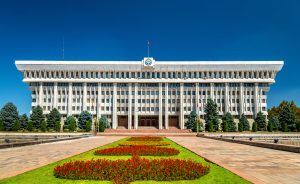Technically, 83 of 90 members of the Kyrgyz parliament, the Jogorku Kenesh, were registered at the February 22 meeting at which the body passed in its second reading the controversial “foreign representatives” bill. Technically, 64 deputies voted for the bill and five voted against.
24.kg, however, counted no more than 50 deputies in the hall and, citing video of the voting, noted that some deputies – in violation of parliamentary rules – voted in place of their absent colleagues. They can be seen blatantly casting votes on neighboring computer terminals.
The bill, proposed and promoted by Nadira Narmatova, has drawn sharp criticism, much as it did nearly a decade ago when an earlier effort to put in place a Russian-style “foreign agents” act ultimately failed. Narmatova, the bill’s author, seems determined to get the act passed and if the farcical February 22 vote is anything to judge by, she may get her wish.
Although some changes have been made to the bill since its resurrection last year, such as the dropping of criminal liability for violations, opponents remain deeply concerned about the impact its passage will have on Kyrgyzstan.
Earlier this month, the director of the OSCE Office for Democratic Institutions and Human Rights, Matteo Mecacci, and the OSCE representative on Freedom of the Media, Teresa Ribeiro expressed their concerns, noting in particular the bill’s potential “negative impact on civil society, human rights defenders, and the media.”
Dastan Bekeshev, a vocal opponent to the bill, earlier said that the law would “be used as a weapon.”
In the most recent parliamentary hearing on the bill, Bekeshev asked if Narmatova herself should be considered a foreign agent. Bekeshev’s question pointed to 2022 reporting by PolitKlinika that uncovered that the Russian consulate in Osh is located in a building owned by Narmatova. Narmatova responded that had the law “been passed 10 years ago, there would not have been such caustic questions as yours, and there would be no state traitors. This [bill] is for the sake of security, peace, and independence of the state.”
Back in 2022, when PolitKlinika initially reported on the building Narmatova denied she owned it. In her recent comments in parliament, Narmatova said she acquired the building on credit in 2009 – incidentally the same year the Russian consulate began renting it – and she was still paying it off. She went on to say that “As a citizen of Kyrgyzstan, I can rent out my property to whomever I want.”
Bekeshev expanded on his opposition, noting economic consequences. “We will see this ourselves within a year. Business will see. How many projects in the fields of education, agriculture and others are being implemented through [NGOs]? I am against the bill,” he argued.
As RFE/RL’s Kyrgyz Service, Radio Azattyk, reported, other deputies who voted against the bill – Suyun Omurzakov, Eldar Abakirov, and Nurzhigit Kadyrbekov among them – aired concerns that the bill would limit the work of NGOs in the educational field. Kadyrbekov, for example, noted that he’d studied in Japan on a full grant and noted that foreign donors fund a variety of education programs in Kyrgyzstan.
The bill, if passed into law, would see non-profit organizations/non-governmental organizations that receive funding from abroad labeled as “foreign representatives” if they carry out “political activities.” Such organizations would be subject to additional reporting requirements and inspections and could be suspended and ultimately liquidated by government order.
A core problem with the bill, its opponents note, is the sweeping definition of “political activities.” These activities include:
– participation in the organization and holding of public events in the form of meetings, rallies, demonstrations, processions or pickets, or any combination of these forms, organization and holding of public debates, discussions, reports;
– participation in activities aimed at obtaining certain results in elections and referendums, monitoring of elections and referendums, creation of election commissions, referendum commissions, and activities of political parties;
– public appeals to state bodies, local self-government bodies, and their officials, as well as other actions that affect the work of these bodies, including the adoption, modification, cancellation of laws or other normative legal acts;
– dissemination of opinions about the decisions made by state bodies and the ongoing policy, including dissemination using modern information technologies;
– formation of socio-political views and beliefs, including public opinion polls and publication of their results or conducting other sociological researches;
– involving citizens, including minors, in these activities.
When Narmatova first initiated the bill last year she had 32 co-sponsors. That list has dwindled to 18 and may shrink further given that Iskender Matraimov and Nurlan Rajabaliev – the brother and close associate, respectively, of again-fugitive former deputy customs head Raimbek Matraimov – this week resigned from their seats in parliament. Both men were listed as of publication among the foreign representatives bill’s initiators on the Jogorku Kenesh’s website.
One final thing to note: Reading over the above, and exploring the hyperlinked sources, readers will find a number of reputable Kyrgyz media organizations – 24.kg, PolitKlinika, Kloop, and Azattyk. Last month, Kyrgyz authorities detailed 11 journalists, two of which work for PolitKlinika, and sealed the offices of 24.kg. Earlier this month, a Kyrgyz court ordered Kloop to liquidate, after blocking its websites in September 2023. Last year, Azattyk was similarly ordered to shut down before the government and the U.S.-funded outlet struck a deal.
Indisputably, among the organizations most at risk in Kyrgyzstan from the consequences of the foreign representatives bill are media organizations like these, many of which (though not all) are supported by foreign donors and organizations in one way or another. Bishkek has made it clear that investigative or critical reporting on the government is not welcome.

































